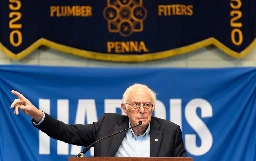Bernie Sanders: We Need More Working-Class Candidates to Challenge Both Parties
Bernie Sanders: We Need More Working-Class Candidates to Challenge Both Parties

Bernie Sanders: We Need More Working-Class Candidates to Challenge Both Parties

Bernie Sanders caused a stir last week, when the independent senator from Vermont and two-time contender for the Democratic presidential nomination sent a post-election email to his progressive supporters across the country. In it, he argued that the Democrats suffered politically in 2024 at least in part because they ran a campaign that focused on “protecting the status quo and tinkering around the edges.”
In contrast, said Sanders, “Trump and the Republicans campaigned on change and on smashing the existing order.” Yes, he explained, “the ‘change’ that Republicans will bring about will make a bad situation worse, and a society of gross inequality even more unequal, more unjust and more bigoted.”
Despite that the reality of the threat they posed, Trump and the Republicans still won a narrow popular-vote victory for the presidency, along with control of the US House. That result has inspired an intense debate over the future direction not just of the Democratic Party but of the country. And the senator from Vermont is in the thick of it.
In his email, Sanders, a member of the Senate Democratic Caucus who campaigned in states across the country this fall for Vice President Kamala Harris and the Democratic ticket, asked a blunt question: “Will the Democratic leadership learn the lessons of their defeat and create a party that stands with the working class and is prepared to take on the enormously powerful special interests that dominate our economy, our media and our political life?”
His answer: “Highly unlikely. They are much too wedded to the billionaires and corporate interests that fund their campaigns.”
